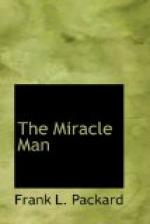“New York,” the Patriarch answered.
“And I never half appreciated the old town nor the fulness thereof until I came to Needley!” said Madison plaintively to the toe of his boot, while his hand scrawled the inquiry: “What is her name?”
“Vail,” wrote the Patriarch. “That was her father’s name. She is my grand-niece on her mother’s side. I do not know what they christened her.”
Madison once more, apparently deep in thought, sought refuge at the fireplace, his hands plunged in his pockets, his shoulders drawn a little forward, his back to the Patriarch.
“Fiction,” he assured a crack in the cement between two stones, “was never, never like this. It seems to me that I remember the occurrence. It had grown a little dim with the lapse of time, it is true; but now that I recall it, it comes back with remarkable clearness. I am quite sure they christened her—Helena. Helena Vail! Now isn’t that a perfectly lovely name for a novel! And she’ll be so good to the dear old chap too—washing and ironing and cooking for him—and stealing out into the woodshed for a drag on her cigarette—not. No, my dear, not even that—this is serious business.”
He turned, came back to his chair, picked up the slate, and wrote:
“I have the fortune, or misfortune perhaps, to be what is commonly called a rich man. Money, they say, will do anything, and if it will I’ll find this niece for you.”
The Patriarch’s eyes grew moist as he read the words, and his hand trembled a little with emotion as he held the pencil.
“I cannot let you do that,” he protested. “You are very kind, and it seems almost as though you had been brought to me providentially at the end of long years of loneliness for a purpose, when my hour of helplessness was near; but, indeed, I have no right to allow you to do this.”
“They tell me in the village,” wrote Madison in reply, “that you have always refused to accept a penny for anything you have ever done for them. I have no doubt you would equally refuse to accept anything from me for what you may do, and I should hesitate to offer it however much I felt indebted, but this is something that you must let me do. It will make me feel more—how shall I say it?—more as though I had a right to the privilege of coming here.”
The Patriarch wiped his still moist eyes before he answered.
“What can I say to you? It does not seem right that I should let a stranger do so much, and yet it seems that I should not say no because—”
Madison was bending over the slate, reading as the other wrote, and he took the pencil gently from the Patriarch’s hand.
“You must not look on me any longer as a stranger,” he wrote. “Let us just consider that it is all arranged—only I would strongly advise making no mention of it until we make sure that she is alive.”
“I think nothing should be said,” agreed the Patriarch. “For even if you found her she might not care to come—I have little here to offer a young girl—few comforts—the care of a blind man who is deaf and dumb.”




